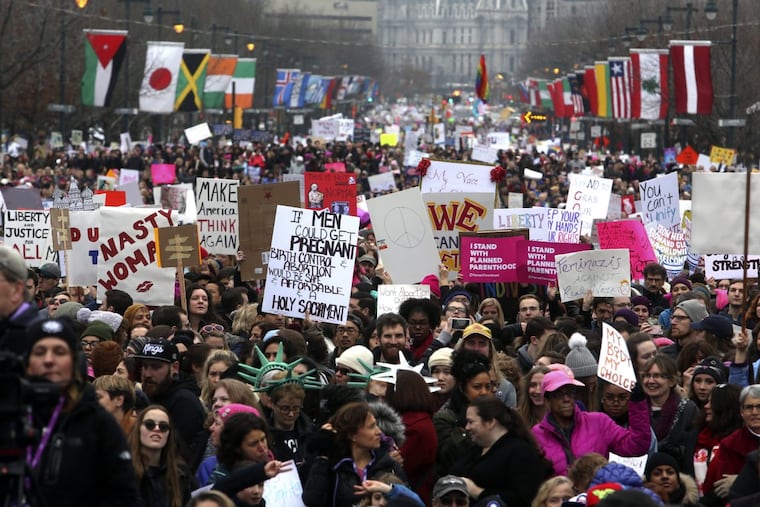The most sobering stats from the city's report on the state of women and girls in Philly | Perspective
14 alarming statistics about how much work Philly must do to achieve gender equality.

On Wednesday night, about 70 women gathered at West Philadelphia's School for the Future for the formal presentation of "The State of Women and Girls in Philadelphia," the first report from the year-old Philadelphia Commission for Women. Philadelphia is the 32nd city to have a women's commission.
Executive director Jovida Hill says the intent of this report is to establish a baseline of information about where things stand for women in the city. "This is a beginning and not an end," Hill stressed by phone on Thursday afternoon. "It is not a be all and end all in terms of the state of women and girls in Philadelphia. It's a snapshot."
For its second year, the commission plans to focus on economic empowerment for women.
"When you're looking at what we do in Philadelphia for women, pay equity is an important issue," Hill said. "Raising the minimum wage is an important issue. Access to capital for entrepreneurs is an important issue."
The mood at the meeting was upbeat. More than once, Hill cheerfully invoked the famous Hillary Clinton quote, "Women's rights are human rights."
But the 40-page report is brimming with sobering statistics about how much work Philadelphia needs to do to achieve gender equality. It's impossible not to focus on the damning facts that underscore what many women already know: In Philadelphia, women are still under-represented in business and government, and there are pressing health-care issues, especially related to pregnancy and childbirth.
It's hard to read it without getting angry.
"It was not our intent for this report to be depressing," Hill said. "Last week, we got the bad news that Philadelphia is one of the poorest big cities. [We also know that] 60 percent of children under 18 are living in female-headed households. I would surmise that means there are a whole lot of women who are living in poverty in the city of Philadelphia if you connect the dots."
Connecting the dots is important, but so is the stark reality of statistics. Below, a sampling of some of the grimmest facts and figures from the commission's report.
Click here to read the full report: "The State of Women and Girls of Philadelphia, 2017."
Money and work
There are nearly 41,000 women-owned businesses in Philadelphia, but women own fewer than 40 percent of the city's businesses.
Women represent 14 percent of the members of boards of directors in Philadelphia-area public companies, 29 percent of university boards, and 24 percent of hospital boards.
Only 17 of the 110 AFL-CIO affiliated union locals in Philadelphia have elected women presidents or business managers.
Of 844 board seats in Philadelphia, 120 are held by women, just 14 percent.
The percentage of Philadelphia women in the tech workforce is shrinking. In 2015, women made up 30.8 percent of the tech workforce, coming in first in a ranking of 50 U.S. markets. In 2016, that percentage dropped to 28.4 percent, and Philadelphia dropped in the ranking to 10th.
A gender gap remains with regard to median wages in Philadelphia with women earning $29,816 and men earning $35,599. (Silver lining: The gap is still smaller than the national average.)
Health
Philadelphia's infant mortality rate of 8 per 1,000 births is one of the highest in the nation. For African Americans, the mortality rate is 13 per 1,000 births.
In Philadelphia, the percentage of low birth weight infants (infants weighing less than 5 pounds, 8 ounces) among non-Hispanic black women is almost 1.3 times higher than that of the general population and almost 1.9 times that of non-Hispanic white women.
In 2014, 10.7 percent of infants in Philadelphia were born pre-term compared with the national rate of 9.6 percent.
As of 2013, Philadelphia had only six maternity wards, down from 19 in 1997. Only two of the six maternity wards are located in North Philadelphia, the area with the highest infant mortality rates.
Despite the prevalence of breast cancer nationwide, 21.9 percent of women 18 years of age and older have not had a breast exam in the past two years and 21.4 percent of women aged 40 and older have not had a mammogram.
Violence
An estimated 2,000 annual visits to Philadelphia emergency rooms are attributed to women who were assaulted by a spouse, ex-spouse, boyfriend or ex-boyfriend.
Government
Women represent 35 percent of City Council and 31 percent of the Philadelphia delegation to the state Legislature.
Pennsylvania has no women serving in Congress.
Click here to read the full report: "The State of Women and Girls of Philadelphia, 2017."